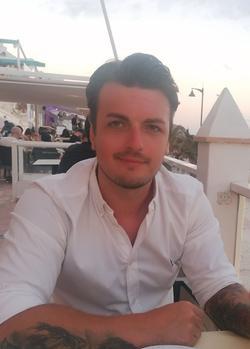Meet Early Career Microbiologist of the Year talk finalist: Ronnie Mooney

What are your current research interests?
I am a postdoctoral research fellow in Civil and Environmental Engineering at the University of Strathclyde, working at the intersection of biomedical and environmental sciences. My research examines amphizoic amoebae and their bacterial endosymbionts, focusing on how these relationships drive antimicrobial resistance (AMR) spread, influence pathogenicity, and affect detectability. Using molecular biology, omics, bioinformatics, and cytotoxicity assays, I collaborate with clinicians, industry partners, wastewater treatment plants, and aquaculture specialists. Current projects address pathogens such as Acanthamoeba in eye health and Neoparamoeba in gill disease, aiming to deliver innovative monitoring and mitigation strategies across healthcare, environmental, and industrial sectors worldwide.
How would you explain your research to a GCSE student?
I research microscopic organisms called amoebae, which can live in water, soil, or even on humans, where they can cause serious diseases. Part of my work involves testing new ways to treat pathogenic amoebae, such as Acanthamoeba, an amoeba which can cause serious eye infections. Additionally, amoebae often carry bacterial partners which can cause disease and resist antibiotics. I investigate how this partnership helps bacteria survive, spread, and sometimes become more harmful or harder to detect. My work helps hospitals, environmental agencies, and industry develop better ways to control these microbes, reducing risks to human, animal, and environmental health.
What do you love most about your job?
What I love most about my job is the variety and purpose it brings. I have the opportunity to travel to fascinating places, from research labs to unique field sites, and to collaborate with people from diverse backgrounds and cultures. Each project offers the excitement of making new discoveries and exploring questions that genuinely interest me. Most importantly, my work has real-world impact, whether it’s improving disease detection, developing new treatments, or helping protect communities at risk. Knowing that my research can contribute to better health and safer environments is what keeps me motivated every day.
Why does microbiology matter?
Microbiology matters because microbes are everywhere, shaping our health, environment, and even the climate. They drive essential processes like nutrient cycling, but they can also cause disease and spread antimicrobial resistance (AMR). Understanding microbes allows us to prevent and treat infections, protect food and water supplies, and develop new medicines and technologies. In my work, microbiology reveals how microscopic interactions, such as between amoebae and bacteria, can influence global health. By studying these hidden relationships, we can anticipate risks, design better monitoring tools, and create solutions that benefit human, animal, and environmental well-being on a global scale.
How do Society events, such as Annual Conference, promote your professional development?
Society events, like Annual Conference, are invaluable for my professional development. They provide a platform to share my research with a wide scientific audience, receive constructive feedback, and explore new perspectives that shape future projects. These events also foster networking, connecting me with collaborators from academia, industry, and government, both in the UK and internationally. Attending workshops and specialist sessions helps me stay up-to-date with the latest techniques and developments in microbiology. Perhaps most importantly, they create a space for exchanging ideas and building relationships that can translate into meaningful, long-term research partnerships.
You can find and follow Ronnie on X (formerly Twitter): @RonnieMooney_ and Linkedin: Ronnie Mooney
